‘Grounded’ at American Blues Theater: Boom! goes the rocket blast, and pilot’s life implodes
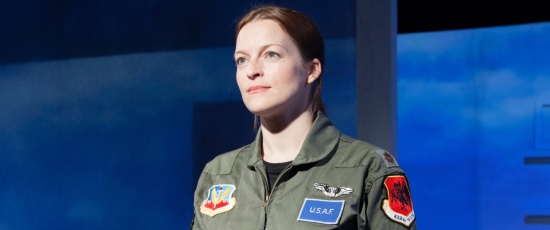 Review: “Grounded” by George Brant, produced by American Blues Theater at Greenhouse Theater Center through July 13. ★★★★
Review: “Grounded” by George Brant, produced by American Blues Theater at Greenhouse Theater Center through July 13. ★★★★
By Lawrence B. Johnson
This pilot, a U.S. Air Force fighter pilot, is the sort of jock you might expect: a lone wolf who’s only really happy up there in the wild blue yonder, at the controls of an F-16 that even has a name, Tiger, and homing in on targets in the midst of a Middle East war, launching rockets that deconstruct domes and minarets back into sand. Yet there’s a mentionable wrinkle. The Pilot in playwright George Brant’s monodrama “Grounded” is a woman.
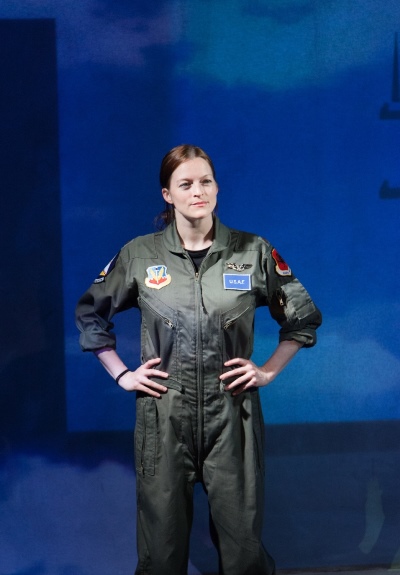 The Pilot doesn’t have a name, metaphorical in itself, but the actor does. Gwendolyn Whiteside, the producing artistic director of American Blues Theater, suits up and steps out front to portray a human being who thinks she knows herself – only to discover her true humanity in both the sweetest and the most devastating terms.
The Pilot doesn’t have a name, metaphorical in itself, but the actor does. Gwendolyn Whiteside, the producing artistic director of American Blues Theater, suits up and steps out front to portray a human being who thinks she knows herself – only to discover her true humanity in both the sweetest and the most devastating terms.
Everything about life in the combat zone energizes the Pilot: the physical connection to her fabulous aircraft, the wondrous vistas of blue, the very real danger, the thrilling concept of destructive power that allows her to push a button and…BOOM! A target is blown away; or anyway she assumes it is. By the time her missiles strike, she and her roaring Tiger are long gone, off in search of other targets.
At night, she drinks with her fellow sky warriors and trades tales of derring-do. Whiteside, looking straight and fit in her flight suit, describes this magical, precious existence with an ardor that freely edges into braggadocio. It’s the rapture of one who doesn’t really expect the listener to understand. To fully understand, you’d have to be one of the boys, one of the few, like her: highly trained, fearless, proud down to your heels.
Then the unforeseeable happens. The Pilot, not at all incidentally a woman, returns to the U.S. on leave, meets a guy in a bar – a nice enough guy who, unlike most of the guys, isn’t intimated by who and what she is. They like each other. But after a one-night stand, she’s back in the Middle East zooming through the blue with Tiger, finding targets, pressing that button…BOOM!
She also discovers she’s pregnant. But the guy, the one-night father, greets the news with empathic tears. Fact is, they’ve missed each other. They get married and a daughter is born.
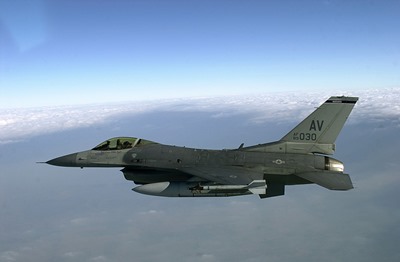 Whiteside’s narrative keeps you on course with her because, despite this sudden turn of events, she makes it all sound so credible. This is a woman in love with life, and capable of going where it takes her. And she loves the idea of having a child – a daughter.
Whiteside’s narrative keeps you on course with her because, despite this sudden turn of events, she makes it all sound so credible. This is a woman in love with life, and capable of going where it takes her. And she loves the idea of having a child – a daughter.
Yet the momentum and impulse of her old life catches up with her, and she yearns to be back up there feeling the pull of G-force. Her husband’s OK with that, so she reports back for duty at a local base and gets a big welcome. Pilots are needed desperately, but in a new way. She won’t be going up: She’ll be guiding drone aircraft in the skies over Iraq – from a trailer near Las Vegas.
The “chair-force,” replies the Pilot, dismayed and contemptuous. But the commander explains that skilled pilots are essential to operate this new-age, remote-controlled aircraft, a weapon so agile, precise and deadly that the vaunted F-16 is no longer being built.
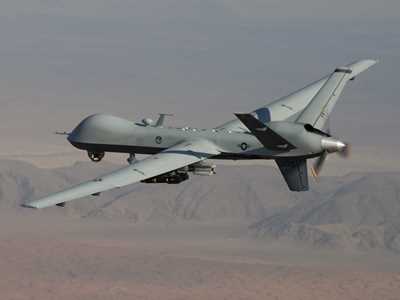 From her Vegas outpost, she will monitor a video display from a drone’s belly-mounted camera. And though the aircraft is scrutinizing a landscape 8,000 miles away, its response to any motion of her joystick is almost instant – 1.2 seconds.
From her Vegas outpost, she will monitor a video display from a drone’s belly-mounted camera. And though the aircraft is scrutinizing a landscape 8,000 miles away, its response to any motion of her joystick is almost instant – 1.2 seconds.
Thus Whiteside’s Pilot describes her routine in the new Air Force, the daily drive from Las Vegas out to her desert command post where she puts in a 12-hour shift staring at a screen. Primarily, the drone scans roadways ahead of U.S. military vehicles, looking for bad guys — specifically adult males of combat age — planting explosive devices.
These suspects appear on the monitor in sharp enough detail to allow the Pilot’s teammates to decide thumbs up or down, meaning “guilty.” Death. She presses the button that releases the drone’s pinpoint rockets.
It is from this juncture that Whiteside’s narrative and dramatic skills are put to the test, and where she begins to draw the viewer in. For no longer can the Pilot escape without seeing the result – in detail – of her action. It’s right there on the screen, indeed, for all of us to see projected onto a vast rear-stage screen. BOOM! And a huddle of human beings are translated into smoke. For the first time, the Pilot sees amid the dust and vapor body parts flying about. (We do not.)
The gathering urgency of Whiteside’s performance gains incalculably from the collective work of director Lisa Portes, who makes subtle use of set designer Sarah E. Ross’ scrim partitions; Mike Tutaj’s mesmerizing projections, Sarah Hughey’s lighting and Lindsay Jones’ original music and sound design.
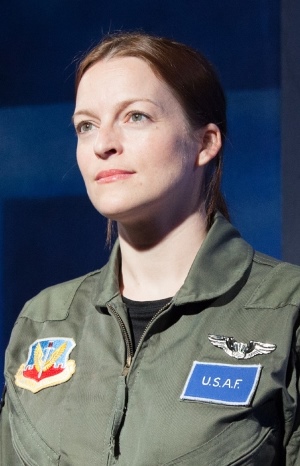 Day by long, surreal day, the push and pull of the Pilot’s actions and of her incredible power begin to tear at her. The operators of the drones, those inescapable bearers of death, are like gods; rather, they are gods. No one can hide from them; resistance is irrelevant.
Day by long, surreal day, the push and pull of the Pilot’s actions and of her incredible power begin to tear at her. The operators of the drones, those inescapable bearers of death, are like gods; rather, they are gods. No one can hide from them; resistance is irrelevant.
But increasingly, the Pilot’s awful supremacy and its consequences infiltrate her conscience. The gray image she surveys becomes muddled with the gray desert of her daily commute; a car she is tracking looks very much like her own. Then there’s the little girl.
Across an arc from swaggering cowboy of the boundless blue to one soul plainly observing her annihilation of others, Whiteside carries us on a journey beyond the uselessness of war to its moral turpitude.
When the Pilot bails, we are floating there with her, looking down through the smoke and sand with clear, horrified eyes at the shards of our own humanity.
Related Link:
- Performance location, dates and times: Details at TheatreinChicago.com
- Watch three video clips from American Blues Theater’s ‘Grounded’: See them here
Tags: American Blues Theater, George Brant, Grounded, Lindsay Jones, Mike Tutaj, Sarah E. Ross, Sarah Hughey

